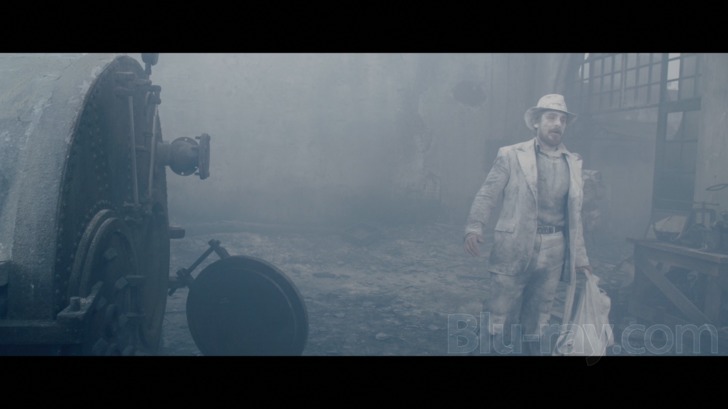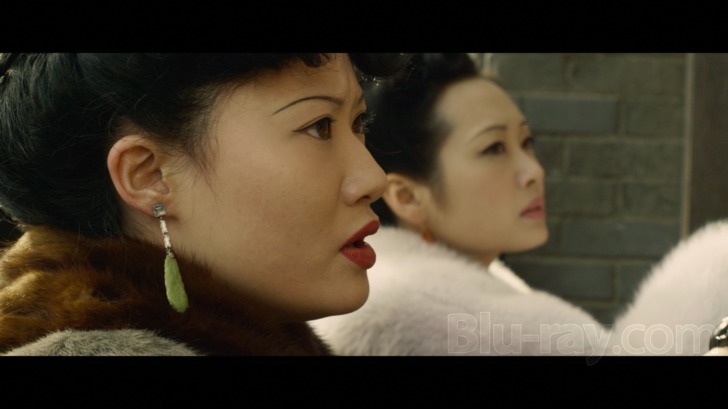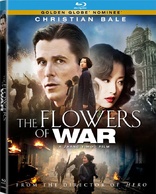The Flowers of War Blu-ray Movie
HomeThe Flowers of War Blu-ray Movie 
金陵十三钗 / 金陵十三釵 / Jīnlíng Shísān ChāiLionsgate Films | 2011 | 142 min | Rated R | Jul 10, 2012
Movie rating
7.5 | / 10 |
Blu-ray rating
| Users | 4.5 | |
| Reviewer | 4.0 | |
| Overall | 4.1 |
Overview
The Flowers of War (2011)
A story of love and war - and a band of outcasts who emerge as unlikely heroes from the shadows of a city's occupation. At once lyrical and visceral, in the apocalyptic world of Nanjing in 1937, a vibrant human story about the invisible people of the city and a series of unexpected relationships that lead to a resonant act of sacrifice.
Starring: Christian Bale, Ni Ni, Tianyuan Huang, Atsurô Watabe, Dawei TongDirector: Zhang Yimou
| Drama | Uncertain |
| History | Uncertain |
| War | Uncertain |
| Foreign | Uncertain |
| Period | Uncertain |
| Action | Uncertain |
Specifications
Video
Video codec: MPEG-4 AVC
Video resolution: 1080p
Aspect ratio: 2.40:1
Original aspect ratio: 2.39:1
Audio
English: DTS-HD Master Audio 7.1
Subtitles
English, English SDH, Spanish
Discs
50GB Blu-ray Disc
Single disc (1 BD)
Packaging
Slipcover in original pressing
Playback
Region A (locked)
Review
Rating summary
| Movie | 3.0 | |
| Video | 4.5 | |
| Audio | 5.0 | |
| Extras | 3.0 | |
| Overall | 4.0 |
The Flowers of War Blu-ray Movie Review
There are a few weeds among the flowers.
Reviewed by Jeffrey Kauffman July 3, 2012Westerners can be a little narrow minded when asked about history, tending to focus only on events that have affected their little corner of the globe. Therefore, if one were to ask a group of Americans about Japanese aggression in the 20th century, chances are nine out of ten (at least) of them would talk about the attack on Pearl Harbor on that epochal day that has indeed in the words of Franklin Delano Roosevelt lived in infamy. But the Japanese had been invading imperialists for years before their incredibly destructive flight over Hawaii. If one were to ask a Chinese group about Japanese aggression in the 20th century, chances are the answers would be as consistent as the hypothetical responses given by Americans above, but in a totally different context. Japan had been involved in various conflicts with China for decades, and while skirmishes here and there had dotted the early 1930s, by the late 1930s tensions had broken out into a more “formal” conflict, the Second Sino-Japanese War (the first had been fought in the late 19th century, some indication of just how long the relationship between the two nations had been strained). The Second Sino-Japanese War lasted long enough that it actually was subsumed by the global conflict of World War II once Japan attacked the United States in December 1941, but four years previously the Chinese were desperately trying to maintain their national sovereignity after Japan launched a devastating series of attacks which saw several major Chinese cities falling rather quickly to Japanese forces. Shanghai had already fallen in 1937 by the time the Japanese turned their sights on the Chinese capital, Nanking. (It should be noted that Nanking is variously transliterated as either Nankin or the more contemporarily preferred Nanjing, but the subtitles of the film under review transliterate it as Nanking, so that is the spelling that will be employed in this review.) The Flowers of War is a fictionalized account of a group of survivors who band together as the Japanese run ramshod through the city of Nanking. Featuring a somewhat bizarre characterization by Christian Bale as an American mortician, the film is perhaps more notable for a fine assortment of supporting performances by a large (and largely inexperienced) Chinese cast. The film was China’s entry into the 84th Academy Awards as Best Foreign Language Film, though it failed to make the shortlist of eventual nominees.

The film begins with a frighteningly effective sequence that sees both a gaggle of young Chinese schoolgirls and Bale, as American mortician John Miller, stumbling through the ruins of Nanking as a vicious assortment of Japanese troops maraud through the city, basically shooting anything that moves. While the girls huddle in a bunch of debris which they believe shields them from sight, Miller manages to fall into a huge pile of flour, coating himself in a ghostly white powder. Japanese troops soon find several of the girls, albeit by accident, spearing one of them with a bayonet when they make some noise as the troops pass. Miller, meanwhile, has managed to evade one soldier who has seemed about to shoot him, jumping into a shell cannon where he’s shocked to find two extremely frightened young Chinese girls. It turns out the girls speak English and they are in fact from Winchester Cathedral, an American funded convent school whose headmaster Priest has just died, and who Miller is there to bury.
Miller manages to squirrel the two back to the Cathedral, where they’re joined by the rest of the surviving girls. Miller reveals himself to be somewhat of a scoundrel, a sort of sibling character to Humphrey Bogart’s Mr. Allnut from The African Queen. Miller is out for quick cash and really couldn’t care less that he’s surrounded by children in a precarious predicament. Soon he’s surrounded not just by children but by a group of “working girls” who don’t take “no” for an answer at the compound’s imposing gate, and simply hoist themselves over to hopefully find some refuge inside the walls. Miller’s baser instincts hold true here as well, and he puts the move on the women’s leader, Yu Mo (Ni Ni), until she pushes him away, telling him he won’t enjoy her favors (or those of the rest of the women) until he helps them get out of Nanking.
Things take a decidedly more serious turn when a bunch of lowlife Japanese soldiers manage to break through the compound’s gate and attempt to round up the young girls for their sexual pleasure, screaming to each other that they’ve found some prized virgins. This seems to both figuratively and literally awaken Miller from his alcoholic stupor, and, finding himself clad in the dead Priest’s vestments, he assumes the role of the Cathedral’s Priest, insisting (unsuccessfully) that the soldiers leave the young kids alone. Only the efforts of a lone Chinese sniper draws the Japanese away from their debased intentions, but Miller has now found himself in a new role, one which is a distinctly odd fit.
The Flowers of War is a huge film, one that wants to walk a tightrope between gigantic set pieces and the more intimate story of Miller and his various charges. This is evidently the most expensive film in Chinese history and was one of China’s biggest blockbusters in 2011, but Western audiences may find the production oddly bloated and even more ironically not especially helped by Bale, whose presence was no doubt added to help market the film outside of its home country. The problem with Bale and Miller is several fold here. First of all, the character of Miller is not especially likable, though he, like Mr. Allnut before him, attempts to redeem himself with some righteous behavior. Second of all, the interpolation of an American character into this Eastern story seems a desperate gambit done only for marketing reasons. The film would have worked just as well if the kids and the prostitutes had worked together to forge their own escape, and in fact it may have worked decidedly better. That’s because of the third problem: Bale himself. Bale seems a rather self-absorbed actor, a proclivity not helped by his now infamous tirade against a stagehand who “blocked his sight line” in that anecdote which went viral (and for which to his credit Bale later apologized—probably because he had absolutely no choice). But here, working under a Chinese director who probably had language barriers and not enough clout to reign in the actor, Bale gives a really mannered performance that is more annoying than affecting, and it drags the film down in unexpected ways. (It is kind of interesting to note that Bale is returning to the same general Japanese-Chinese conflict that informed the film that first brought him to attention, Empire of the Sun.)
Still the flaws of The Flowers of War are not Bale’s alone. Director Zhang Yimou, no doubt under the gun (no pun intended) to produce a blockbuster, fills his film with too many arty effects for its own good. Soldiers and various civilians bite the dust in slow motion over and over, and Yimou seems obsessed with a large circular stained glass window in the Cathedral, a window which is repeatedly shattered with gunfire (and yet which manages to remain largely intact). Yimou also loves to have his cameras fly around his sets, with careening crane shots (with an emphasis of overhead shots looking straight down, something which might induce vertigo in some viewers.) On the plus side, Yimou has done incredible work with a large gaggle of amateurs whose first film this was. The kids are largely remarkable, led by a really touching turn Huang Tianyuan as George, the adopted Chinese son of the deceased American priest. George’s arc is actually the most remarkable of the film, yet another reason the presence of Miller, especially in the personage of Bale, seems extraneous and emotionally vapid. The Flowers of War would have blossomed much more effectively had George been the center of attention. As it stands, even with George relegated to supporting player status, it’s his story that will probably stick with most viewers the strongest.
The Flowers of War Blu-ray Movie, Video Quality 

The Flowers of War is presented on Blu-ray courtesy of Lionsgate with an AVC encoded 1080p transfer in 2.40:1. This is an often sumptuously beautiful film, something that may sound a bit unusual considering the fact that so much of the film plays out in debris strewn battle sequences. But Yimou, despite his over reliance on camera tricks, frames a very gorgeously wrought picture here, and this high definition presentation offers it with extremely appealing sharpness and clarity. Fine object detail pops extremely well and colors, while intentionally muted at times, pop quite nicely. About the only concern with this presentation is some less than convincing contrast at times, something which tends to bathe a lot of the interior cathedral scenes in too much murkiness. Otherwise, though, this is a really nicely filmic looking offering, with well rendered CGI artfully woven into the film and a generally extremely precise image that faithfully reproduces a cinematic appearance.
The Flowers of War Blu-ray Movie, Audio Quality 

The Flowers of War features a very nicely done DTS-HD Master Audio 7.1 mix in English and Mandarin which brilliantly utilizes the sound field in a number of boisterous battle scenes, and then just as artfully articulates some very quiet dialogue driven scenes. Ambient environmental effects are very nicely deployed around the surround channels, and one of the mix's best evocations is the huge hall ambience of Winchester Cathedral. Several sequences feature bullets zinging in from this direction or that direction, and the foley effects are extremely convincing, with impeccable use of discrete channelization. The subtle but very effective score is also very nice rendered in this lossless environment. Fidelity is superb and dynamic range is amazingly wide.
The Flowers of War Blu-ray Movie, Special Features and Extras 

The bulk of the supplements is comprised of a multi episode feature called Behind the Scenes of The Flowers of War. It contains the following featurettes:
- Episode 1: The Birth of The Flowers of War (HD; 21:08) is an interesting overview of the genesis of the production, with some fun (and sometimes funny) footage of the young amateurs who would join the film doing screen tests.
- Episode 2: Meeting Christian Bale (HD; 16:20) actual spends quite a bit of time on some fantastic behind the scenes footage and ruminations by director Zhang Yimou before it moves on to talking about Bale and some of the challenges of filming a multi-lingual production.
- Episode 3: The Newborn Stars (HD; 22:16) concentrates on the many young actors whose first film this was.
- Episode 4: Hard Time During War (HD; 20:08) deals with some of the logistical challenges of the film's impressive battle sequences.
- Episode 5: Perfection of Light and Color (HD; 13:55) starts with a long sequence detailing the fabricating of the huge stained glass window which is a major part of the church set, and then moves on to some of the issues of filming in cold weather.
- The Flowers of War Trailer (HD; 2:33)
The Flowers of War Blu-ray Movie, Overall Score and Recommendation 

The Flowers of War is a huge film, and that may be one of its chief flaws. At almost two and a half hours long, it feels bloated at times, and that humongous feeling isn't helped by a middling performance by Christian Bale at its center. However, the rest of the film tends to work rather well, especially with regard to the kids, who are marvelous, and the general story, which manages to work up to some considerable heartstring tugging by the final act. Even with its flaws, it's hard not to admire Yimou's stagecraft here, balancing huge battle scenes against quieter moments between the characters. This film probably won't have the impact to Western audiences that it enjoyed in China, but with superior video and impeccable audio, as well as some enjoyable supplements, with warts (and/or weeds) and all, The Flowers of War comes Recommended.
Similar titles
Similar titles you might also like

City of Life and Death
南京!南京! / Nanjing! Nanjing!
2009

My Way
마이웨이 / Mai Wei
2011

Das Boot
The Director's Cut | Single-Disc Edition
1981

The Warlords
Tau ming chong
2007

Kagemusha
影武者
1980

Generation War
Unsere Mütter, unsere Väter
2013

The Way Back
2010

In the Fog
V tumane
2012

Back to 1942
一九四二 / Yi jiu si er
2012

Mongol: The Rise of Genghis Khan
2007

Assembly
Jí Jié Hào
2007

The Captain
Der Hauptmann
2017

In Darkness
2011

The Guns of Navarone
1961

Flags of Our Fathers
2-Disc Special Edition
2006

Winter in Wartime
Oorlogswinter
2008

9th Company
9 rota | Collector's Edition
2005

Letters from Iwo Jima
2006

The Bridge on the River Kwai
1957

Stalingrad
1993
